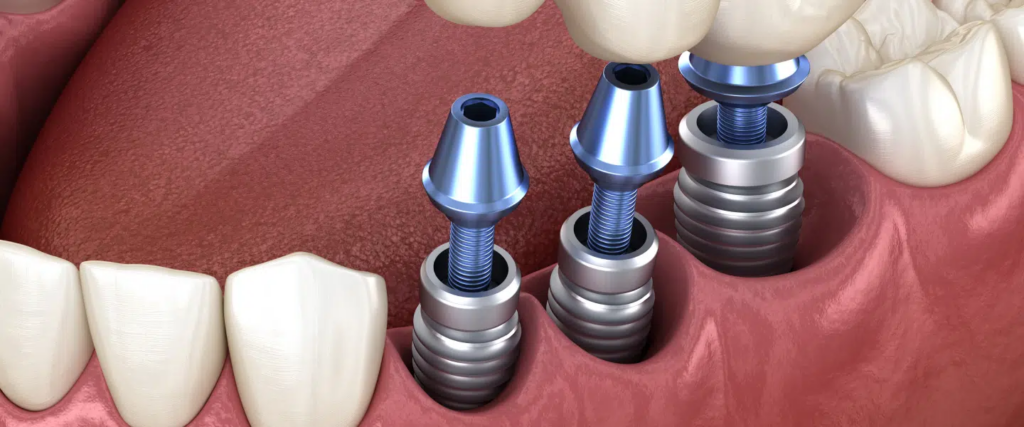
Dental implant surgery is one of the most effective and reliable solutions for replacing missing teeth. While the procedure itself is carried out with precision, the real key to success often lies in what happens afterwards. Recovery plays a pivotal role in ensuring the implant fuses with the bone and remains stable for the long term.
This blog explores the foods that should be strictly avoided following dental implant surgery. With a focus on maintaining comfort, promoting healing, and minimising complications, this guide is ideal for those seeking advice after receiving dental implants in Cardiff or consulting with a dentist in Cardiff.
Why Diet Matters Post-Dental Implant Surgery
After implant surgery, the gums and jawbone go through a sensitive healing period. Tissues are inflamed, blood clots are forming to protect the surgical site, and osseointegration — where the implant fuses with the jawbone — begins. This process can take several months, but the first few weeks are particularly critical.
A poor diet during this stage can slow down the healing process and increase the risk of complications. Hard or sticky foods may disturb the implant area, introduce bacteria, or cause pain. Additionally, foods that are too hot or spicy can inflame tissues and delay recovery.
In contrast, following a tailored, soft-food diet ensures the surgical site remains undisturbed. It also helps reduce inflammation, prevent infection, and improve overall comfort. For patients receiving dental implants Cardiff, following proper post-op dietary advice is part of a comprehensive care plan provided by any reputable dentist in Cardiff.

Key Phases of the Healing Process and Dietary Sensitivity
Understanding the healing stages helps clarify why certain foods must be avoided:
Early Phase (1–3 Days)
- Body Response: Inflammation, bleeding stops, clot formation.
- Food Impact: Hot or crunchy foods can dissolve clots or cause bleeding.
Intermediate Phase (4–14 Days)
- Body Response: New tissue begins forming.
- Food Impact: Sticky or spicy foods can slow regeneration.
Long-Term Healing (15 Days and Beyond)
- Body Response: Bone fuses with implant (osseointegration).
- Food Impact: Hard foods may disturb the bone-implant connection.
As the implant site strengthens, more foods can gradually be reintroduced — but this should be done under professional guidance.
Food Categories to Avoid After Dental Implant Surgery
Let’s explore the food types that should be kept off the plate during the critical recovery period.
Hard and Crunchy Foods
Examples: Raw carrots, apples, crusty bread, popcorn, nuts, crisps.
These foods demand forceful chewing, which exerts pressure on the implant and surrounding tissues. Even minor trauma can dislodge a clot, delay healing, or cause pain. Crumbs from crunchy snacks can also get trapped near the implant, increasing infection risk.
Advice: Opt for well-cooked vegetables or blended versions of fruit instead.
Sticky and Chewy Foods
Examples: Toffees, chewy sweets, gum, caramel, bagels.
Sticky foods can cling to teeth and implant sites, potentially lifting healing tissues or pulling at stitches. They also require more jaw movement, which might stress the surgical area.
Advice: Avoid anything requiring a “pull” or jaw clench to consume.
Spicy and Acidic Foods
Examples: Curry, hot sauce, chilli powder, lemon, vinegar, citrus fruits.
These irritants can inflame sensitive gums, causing a burning sensation or swelling. Acidic items might also compromise tissue healing or create an unfavourable environment for clot stability.
Advice: Choose plain, neutral foods like porridge, broth, or plain yoghurt.
Hot Foods and Beverages
Examples: Soup straight from the pot, coffee, tea, hot chocolate.
Hot items risk dissolving the protective clot that forms over the surgical site. This can lead to a painful condition known as dry socket, where the bone is exposed and healing is significantly delayed.
Advice: Allow food and drinks to cool to a warm or room temperature before consuming.
Sugary Foods and Sweets
Examples: Fizzy drinks, cakes, biscuits, chocolates, sugary cereals.
Sugar fuels harmful bacteria, and during recovery, the mouth’s ability to defend itself is weakened. Increased sugar intake can lead to infection or gum disease, both of which can compromise implants.
Advice: Stick to low-sugar snacks like mashed bananas or plain Greek yoghurt.
Alcohol and Carbonated Beverages
Alcohol interferes with the healing process by thinning the blood and delaying clot formation. Carbonated drinks — especially when acidic — create bubbles that may irritate healing gums or disturb the implant site.
| Beverage Type | Reason to Avoid |
| Beer / Wine | Slows healing, increases bleeding risk |
| Fizzy Pop | Acidic and carbonated — causes gum discomfort |
| Energy Drinks | High in sugar and caffeine — slows recovery |
Advice: Water is best — stay hydrated without compromising healing.
Tough Meats and Chewy Proteins
Examples: Steak, jerky, sausages, bacon.
These require forceful chewing and often tug at the gums, increasing the likelihood of dislodging the implant. Even minced or fibrous meat can be a challenge when the jaw is still sore.
Advice: Switch to scrambled eggs, soft fish (like cod), or mashed lentils.
What to Eat Instead: A Quick Overview
| Food Category | Suitable Choices |
| Soft Proteins | Scrambled eggs, tofu, mashed lentils |
| Carbohydrates | Mashed potatoes, porridge, white rice |
| Fruits & Veg | Steamed carrots, avocado, banana purée |
| Dairy | Yoghurt, cottage cheese, soft cheeses |
| Liquids | Smoothies, soup (lukewarm), water |
These alternatives provide nourishment without disrupting the implant site and are often recommended by a dentist in Cardiff for optimal healing.

Tips for Easier Eating and Faster Recovery
- Cut food into small, manageable bites to minimise chewing pressure.
- Eat slowly to avoid strain or accidental trauma.
- Avoid drinking through straws, as suction can disturb the surgical site.
- Hydrate often, but sip gently.
- Stick to cold or lukewarm meals — not hot.
- Keep the mouth clean with gentle rinses and dentist-approved mouthwashes.
Common Questions Around Post-Implant Diets
When can normal eating resume?Typically after 2–3 weeks, but it varies per case.
Is it safe to drink through a straw?No. Suction can remove the protective clot.
How long do dietary restrictions last?Soft diets are recommended for 7–14 days. Full recovery may take several months.
Conclusion
Maintaining the right diet after dental implant surgery is one of the smartest ways to ensure smooth healing and long-lasting success. Avoiding crunchy, sticky, spicy, and sugary foods significantly reduces the risk of complications and helps the implant integrate properly.
Whether seeking advice on eating habits post-procedure or undergoing consultation, choosing a trusted dentist in Cardiff is essential. At Super Smile Dental, patients receiving dental implants in Cardiff benefit from comprehensive aftercare advice tailored to individual needs. Recovery begins with smart eating, and support from experienced professionals ensures every bite helps build a stronger smile.